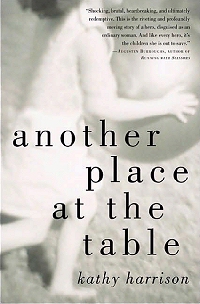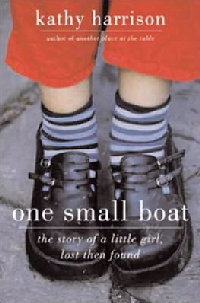
Another Place at the Table
and
One Small Boat:
The Story of a Little Girl, Lost Then Found
by Kathy Harrison
Jeremy P. Tarcher
Reviewed by Marilyn Roy
Anyone
who is interested in the dynamics of birth-foster parent, or foster parent-child
relationships, will want to read at least one of Kathy Harrison’s two
books about her family’s experiences as emergency providers for children
in need of care. Her riveting accounts of the children who have appeared
at her door since she took in her first child give readers an unvarnished
look at the enormous challenges and often unexpected rewards of foster parenting.
Both books are eminently readable, due to Harrison’s writing style,
which could be described as “conversational story-telling.” It’s
like talking across the fence with a neighbor you’ve known for years.
My search for information about the effects of child abuse on young children, and their subsequent adjustment problems following adoption led me first to Another Place at the Table (2003). This, the first of the two books, introduces the reader to the Harrison family, pre-foster care, with a minimum of preamble. Kathy and her remarkably compassionate husband, Bruce, are the biological parents of three boys, newly moved to a too-large, ’60s-style suburban house from their farm in western Massachusetts. With the larger house comes an opportunity to take in two little girls whom the couple eventually adopt. Bruce has taken a new position with the health care industry; Kathy is an elementary school teacher.
As the stories unfold, we see Kathy leaving her profession to become a full-time foster mother, rarely having fewer than ten biological, foster, and adopted children in her house at one time. I was on the edge of my chair, unable to put the book down, during most of the time I spent reading Another Place. Just as the author barely stops to take a breath or reflect on her feelings between placements, the reader is carried along in an interesting stream of constant activity combined with a high level of tension that is almost suspenseful, as one follows the couple’s heartbreaks and successes with each child. The special focus of Another Place is on two small incest victims—a seven-year-old boy and a six-year-old girl—who become long-term placements. In her consistently honest rendering of her dealings with the system that does not always work, the extremes of abuse to which those in her care have been subjected, and the tests of patience and dedication to the children who have become her life’s work, we see in Harrison and her husband two remarkably strong people, capable of deeply loving even the most troubled child.
 The second book, One Small Boat (2006), picks
up where the first one left off, focusing on the story of a delicate little
girl named Daisy, who enters the Harrison’s home as a “voluntary
placement” by her mother. She has also been subjected to sexual abuse
by her mother’s ex-boyfriend, with resulting behaviors that mimic autism;
as other children come and go, Daisy remains, slowly healing with the help
of an unusually gifted therapist, and the love of her foster family. In the
end, she finds her “forever home” with her birth father, who comes
into her life through Daisy’s caseworker.
The second book, One Small Boat (2006), picks
up where the first one left off, focusing on the story of a delicate little
girl named Daisy, who enters the Harrison’s home as a “voluntary
placement” by her mother. She has also been subjected to sexual abuse
by her mother’s ex-boyfriend, with resulting behaviors that mimic autism;
as other children come and go, Daisy remains, slowly healing with the help
of an unusually gifted therapist, and the love of her foster family. In the
end, she finds her “forever home” with her birth father, who comes
into her life through Daisy’s caseworker.
The only fault this writer found with these books was not with the books themselves. Toward the end of One Small Boat, I began to wonder about the author herself—about her need to live in almost constant chaos, rarely having a moment to herself. This may reflect my Catholic upbringing in the 1950s, when women were expected to subjugate their needs to those of their husbands and children, and martyrdom was seen as admirable in historic texts. Fortunately, her next book is on a completely different subject. Kathy Harrison writes about a very tough job that is rarely appreciated by the general public. She writes with compassion, grace, and honesty. She will either inspire her readers to become involved, or turn them completely against the foster care system. As is so evident in both Another Place at the Table and One Small Boat, the demands can be tremendous, the sacrifice great, but the rewards are undeniable.
Marilyn Roy is a regular reader and periodic contributor to the O.I.
Newsletter who lives in Lawrence, KS.
Excerpted from the July 2009 edition of the Operation Identity Newsletter
© 2009 Operation Identity